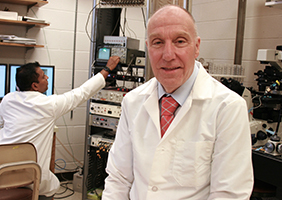
November 6, 2017
AMES, Iowa – Dr. Richard Martin’s work with parasites has led to many discoveries that has global relevance for both human and animal health.
In recognition of his work in this field, Martin has been named the inaugural holder of the Dr. E.A. Benbrook Endowed Chair in Pathology and Parasitology in Iowa State University’s College of Veterinary Medicine.
This is just the latest in a series of honors afforded to Martin in recent months. His lifetime work in parasitology was a major factor in his being named a Clarence Hartley Covault Distinguished Professor in Veterinary Medicine at Iowa State. And in 2017 he was inducted into the Royal College of Veterinary Surgeons as a Fellow by Meritorious Contributions to Knowledge – more evidence of the impact of his parasitology research globally.
Martin says he was influenced in his educational studies by a variety of teachers but one in particular suggested he study veterinary pharmacology.
“I found the subject magical,” he said. “You can cure a disease by finding a magic bullet. These are modern miracles, these drugs. Pharmacology has an aspect of magic that other disciplines don’t.
“I still love the excitement of seeing new results,” he continued. “Something you discover that you didn’t know about previously, going to new places with your research and explaining things to people who want to know about the subject.”
Martin’s research primarily focuses on roundworm parasites. More than 2 billion people in the world’s poorest nations and most domestic animals are infected with nematode parasites which ultimately degrade health, affect animal production and increase poverty.
By using advanced electrophysiological, pharmacological, molecular and parasitology techniques, Martin has discovered and studied the mechanism of action of new drugs used to paralyze and treat roundworm parasites.
“In the absence of adequate sanitation and vaccination, these drugs are used for the control and prevention of both human and animal parasites,” he said. “The economic returns for anthelmintic drugs favor development for animal health in western countries initially, and subsequent application for human health in developing countries.”
Martin’s research has recently secured a patent for a new class of an anti-parasitic drug and he is working with Bayer Corporation on commercialization efforts. He was also recently successful in renewing his NIH RO1 grant in 2017 which will provide over $1.8 million over five years to study pharmacological mechanisms of anti-parasitic drug resistance in animals and humans.
###
